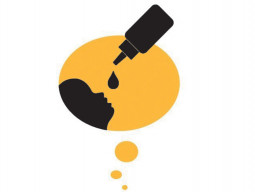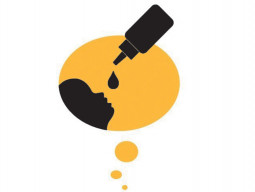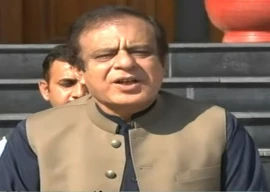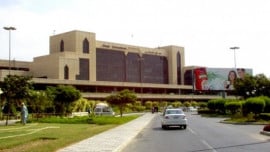
KARACHI: With 73 cases of poliovirus surfacing this year, travellers to and from Pakistan are expected to face restrictions and guidelines by the international community from January 2014.
Dr Ni’ma Saeed Abid, the World Health Organisation (WHO) country head for Pakistan, said that the three polio-endemic countries – Pakistan, Nigeria and Afghanistan – risk becoming source of spreading wild poliovirus (that occurs naturally).
“The existing alarming situation in Pakistan and especially in the city of Karachi, which has historically been considered as the biggest amplifier and transmitter of the virus, will definitely be discussed during the executive board session of the World Health Organisation (WHO),” Dr Abid told The Express Tribune. “Sensing the gravity of situation, it is expected that a number of member states will formally place the travel restrictions and guidelines for Pakistan, which, on the other hand, are technically in place if we consider the International Health Regulations.”
The WHO executive board, comprising 34 professionals who are technically qualified in the field of health and designated by a member state elected to serve by the World Health Assembly, is set to meet from Jan 25 to Jan 30.
While explaining the WHO’s regulations, he said that all travellers arriving from polio-endemic countries, regardless of age and vaccination status, should receive one dose of oral polio vaccine (OPV) at least six weeks prior to departure and should provide its proof as part of their visa applications.
“As long as polio is eradicated from these last remaining strongholds, the countries should take special measures in allowing a citizen from any endemic polio state to not cross the borders without a valid vaccination certificate,” said Dr Abid, who is an epidemiologist by profession.
Meanwhile, Dr Durre Naz Jamal, the deputy project director at the Sindh Expanded Programme on Immunisation (EPI), said the question of the imposition of sanctions by the international community has already been raised with top government officials. “This is not a good sign and a number of Pakistanis will face visa rejections [if the situation is not tackled].”
Earlier on Wednesday, the emergence of two poliovirus cases in Karachi within 24 hours had prompted the head of WHO’s polio eradication initiative in Pakistan, Dr Elias Durry, to signal that the city is likely to head towards an ‘explosive polio outbreak’.
Published in The Express Tribune, December 6th, 2013.
COMMENTS (21)
Comments are moderated and generally will be posted if they are on-topic and not abusive.
For more information, please see our Comments FAQ




































1713509570-0/Taylor-Swift-Album-Release-(1)1713509570-0-270x192.webp)






















There is a double benefit in this. If the ban is enforced lesser chances of incidences of terror worldwide.
@Patriot:
Classic Pakistani chest thumping - long on emotion and short on facts. BTW polio doesn't care how tough you are.
@Karachiwala: There is a big difference between HIV and Polio. There is no vaccination for HIV (as Raj-USA pointed out) and therefore it cannot be eradicated from the world. Polio on the other side should be eradicated completely because there is proper vaccination available. The conservative mindset and other concerns that you mentioned are Pakistan's internal matter and media and NGO's should take active part in creating awareness for it. It would be a shame if the travel ban is in place for pakistan or pak ppl would need a dose of vaccine before travelling. Already it is a shame when a pakistani travel somewhere with green passport and now another problem. Ridiculous that our leaders don't care about it. Imran wants NATO banned but doesn't even know what a menace this polio is and what it could do on the lives of our future generation.
This is set back for our health system and Pakistan.I donot know why different issues are arising each and every day which are going to damage us.We are going to be alone and one reason for this is that our media doesn't show positive aspects of Pakistan.
@Karachiwala: I was made to believe that there are no slums in Pakistan, forget about Karachi. What happened to those commentators who always point a finger to India and say "India is full of slums"?
"We are tough nation, we don’t need to travel to their countries."
I suggest you to visit your local passport office just to see how 'tough' a nation we are and how much we 'don't need' to travel to other countries.
@Ahmed:
"polio problem only emerged after they used an under-cover agent in the form of a polio Dr. "
That's the biggest rubbish ever.
Even if America had used a doctor to extract Osama's body specimen, they are idiots to use polio as the excuse.
Such rubbish can come out of only Pakistan.
First of all, Polio drops are given to the kids, not to 60 year old men.
Second. It's drops. Not an injection to be able to extract something from one's body.
@Karachiwala: There is no vaccination for HIV and HIV spreads only through transfer of bodily fluids whereas there is a vaccination for polio and polio spreads many other ways even without human contacts. If anyone applies for US green card from abroad on someone's sponsorship HIV test is compulsory. In the Gulf countries migrant workers, even those who are on proper work visas are deported if they are found HIV+. These were the rules in US and Gulf countries few years ago. I do not know the current rules. I think it should still remain the same.
There has been discussion going on about imposing travel sanctions for couple of years now and I believe it will be in place by next year.
Soon we all will be prisoners in our own country that is going to be ravaged by by sectarian violence, terrorism, economic collapse, etc with no where to hide or run.
@Patriot: Hmm, and just HOW is the worlds response to Pakistan's POLIO OUTBREAK somehow characterized as the US and West trying to malign Pakistan???
@Patriot:
We are tough nation, we don’t need to travel to their countries.
Please do that,the world will be a better place...
@Patriot: Afridi case hpened in 2011. Any explanation for why polio was not eradicated before that? Plus the uanauthorised vaccination camp was for hepatitis and not polio. So why is polio vaccination being resisted - or are you telling me that from now on no parent will allow any vaccination for their kids?
Funny there is no mandatory testing of HIV + travelers as it is endemic in the West which if untreated causes AIDS which definitely results in death if untreated. Polio only results in paralysis in a very small portion of the infected and yet it is being propagated as being something worth putting travel restrictions on. It would be unfair to put all the blame on our health system since Ive seen ppl themselves voluntarily refuse to get their children vaccinated because of some bizarre conspiracy theories. And my dear Karachi's reputation shouldnt be maligned Since a lot of these cases are in the ppl who migrated from upnorth with poor education and conservative culture. Remember Karachi's 50% population lives in illegal slums about which the Sindh govt wont do anything since they dont exist on their planning maps.
@Patriot: We are tough nation, we don’t need to travel to their countries. " "+++++++++++++++++++++++++++++++++++++++++++++++++++++++ Just look at the travels of your PM. He obviously needs to travel a lot!
@Khan: They should block NATO supplies to protest against this ban. After all America is responsible for this, polio problem only emerged after they used an under-cover agent in the form of a polio Dr. after which people started boycotting polio campaign.
It's interesting that the emphasis here is on foreign travel curbs and visa issues rather than polio-infected Pakistanis spreading a crippling disease to the rest of the planet.
It is the US and West trying to malign Pakistan again. To bring a bad name to us and highlight Shakeel Afridi case to free him. We are tough nation, we don't need to travel to their countries. ET please publish, I have right to express my opinion.
Please take this seriously!! PTI no protest on this?
Pakistan become a menace to world.
This ban is long overdue. Had WHO enforced the ban earliers, there would have not been a polio case in Syria. Better enforce the travel ban on Pakistan now, before it spread to all over the world.